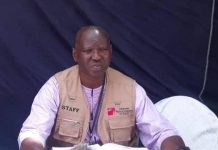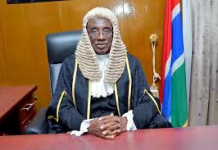By Yankuba Jallow with New Narratives
For victims of The Gambia’s brutal dictatorship, the country’s transitional justice process represents hope for accountability and reparations. But last month’s sudden decision by the incoming administration of United States President Donald Trump to cancel almost all foreign aid has casted a shadow over that hope.
President Trump’s decision to cut much of the $70 billion the US gives out annually in global aid has impacted people across the world. In The Gambia in 2023 the US was one of the two largest bilateral donors, with the European Union, providing $35 million – most of that for food security. Millions had been appropriated by the last US Congress specifically to support The Gambia’s transitional justice process. Most of that has now been cut.
“Anybody involved in the transitional justice process has been affected,” said Sirra Ndow, Chairperson of the Alliance of Victim-Led Organizations (AVLO), an alliance of victim-led organizations.“A big chunk of funding has stopped, and it is having a direct impact on our work.”
The Alliance comprises the African Network against Extrajudicial Killings and Enforced Disappearance, Gambia Center for Victims of Human Rights Violation, Survivors of the Presidential Alternative Treatment, Fantanka, Solo Sandeng Foundation, Women Association for Victim Empowerment, Women in Leadership and Liberation and the Yelef Initiative.
The funding cuts have forced justice sector actors to look for alternative sources of support. While some projects – including advocacy and technical support activities backed by US-backed organizations like the Center for Justice and Accountability and the US government’s National Endowment for Democracy have resumed, others remain stalled.
The Gambia’s transitional justice project, launched in 2017, promised to address the widespread human rights violations that took place during Yahya Jammeh’s 22-year dictatorship. Following the release of the 2021 Truth, Reconciliation and Reparations Commission Report, the government committed to a comprehensive plan that includes implementing the 263 approved recommendations, with a strong focus on prosecution, reparations, and reconciliation.
The government’s transitional justice project has a detailed five-year implementation plan to end in 2027 with 304 activities focused on reparations, justice, reconciliation, and legislative reforms. But with a projected cost of approximately $150 million it is not clear where the money will come from. The SpecialTribunal, set to try some of the 69 people recommended for prosecutionby the country’s TRRC for alleged international crimes that left at least 200 dead and many more tortured, is projected to cost $60 million alone.
Ida Persson, Special Advisor to the Minister of Justice on transitional justice, acknowledged the financial challenges but said she remained hopeful. She said the government is seeking alternative funding from the European Union, African Union, and United Nations. But she acknowledged the U.S. aid freeze is particularly challenging for efforts to set up the court.
“We are doing everything we can to ensure that the work of the TRRC continues and that victims receive the justice they deserve,” Persson said.
In response to the financial crisis, victims’ groups are exploring creative solutions. Ndow noted that they are considering charging visitors at the Memory House, a memorial site dedicated to documenting past atrocities, as a means of generating revenue, among others.
Despite the new financial constraints, efforts to keep the public informed about the justice process continue. Victim-led organizations have been conducting advocacy and outreach programs, explaining developments such as the establishment of the Special Criminal Division of the High Court and the forthcoming Special Tribunal for The Gambia.
A current priority for victim groups is the continuation of reparations through financial and medical support. The Reparations Commission, which is scheduled to commence work next month, will be responsible for building in the interim reparations started by the TRRC by registering new victims that did not come forward during the TRRC and evaluating the harm suffered by them and their families. It will also review reparations already awarded by the TRRC and recommend other forms of reparations, if deemed appropriate.
The Commission is expected to oversee the distribution of reparations to more than 1,000 victims, many of whom still suffer from physical and psychological trauma. But, with limited funding until now, the process has been moving too slowly for victims.
“I am suffering, and my life has not been the same since they shot me which affected my spinal cord more than 20 years ago,” saidYusupha Mbye, a victim of an attack by law enforcement on demonstrating students known by the date “April 10”. More than a dozen young people died. “I have endured a lot and I need urgent medical support. That is what is most important for me.”
Mbye said prosecution is very important, but the government should prioritise reparations.
“Some of the victims have died and some are in critical condition. The victims are dying and it is very frustrating,” Mbye said.
“Reparations is one of the most important things for the victims,” agreed Fatoumata Sandeng, founder and CEO of Solo Sandeng Foundation for Justice and Democracy.“Some cannot work, and they have endured this for a long time. We want complete medical reparations.”
Persson said that despite the setbacks, The Gambia is working towards establishing key judicial mechanisms for prosecutions. These include the Special Criminal Division of the High Court, which is prepared to try cases using Gambian laws, and the Special Tribunal, designed to handle international crimes and violations of international law. The Special Prosecutor’s Office will be responsible for investigating and preparing cases.
As for former President Yahya Jammeh, currently in exile in Equatorial Guinea, Persson said the government is working to ensure that he will face justice. The Gambia could seek extradition. The Special Tribunal will operate within The Gambia but could also hold proceedings in other countries where it could prosecute not only Jammeh but also other perpetrators hiding abroad.
“We have adequate judicial mechanisms to prosecute,” Persson stated. “The Tribunal will be a key element in ensuring that all crimes are addressed.”
Experts say the Special Criminal Division and the Special Tribunal are set to play crucial roles in holding perpetrators accountable, but without sufficient funds and political will, these mechanisms risk stagnation. For victims and their families, the urgency could not be clearer: justice must come—not in another decade, but now with or without international aid.
“You cannot depend your justice system entirely on foreign aid,“ said Sheriff Kijera, the former Board Chairperson of the Gambia Center for Victims of Human Rights Violations, echoing the calls of many victims groups. “It is unacceptable. The government should have provided enough resources to kickstart the operation of the implementation of the TRRC report. I think more needs to be done to enhance the smooth operation of the implementation of the TRRC recommendations.”
This story was a collaboration with New Narratives as part of the West Africa Justice Reporting Project.




















